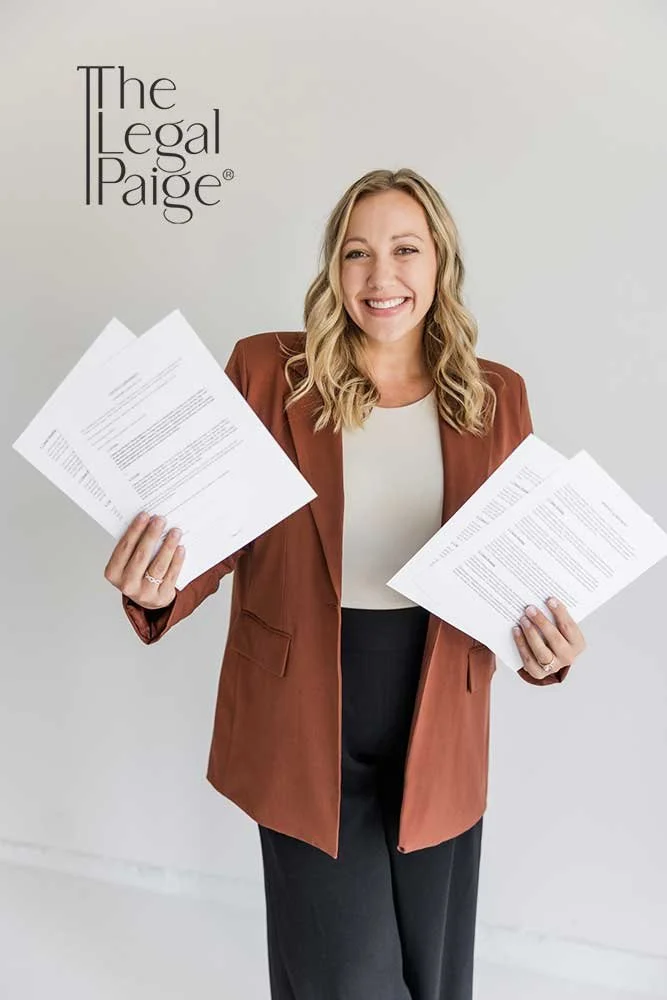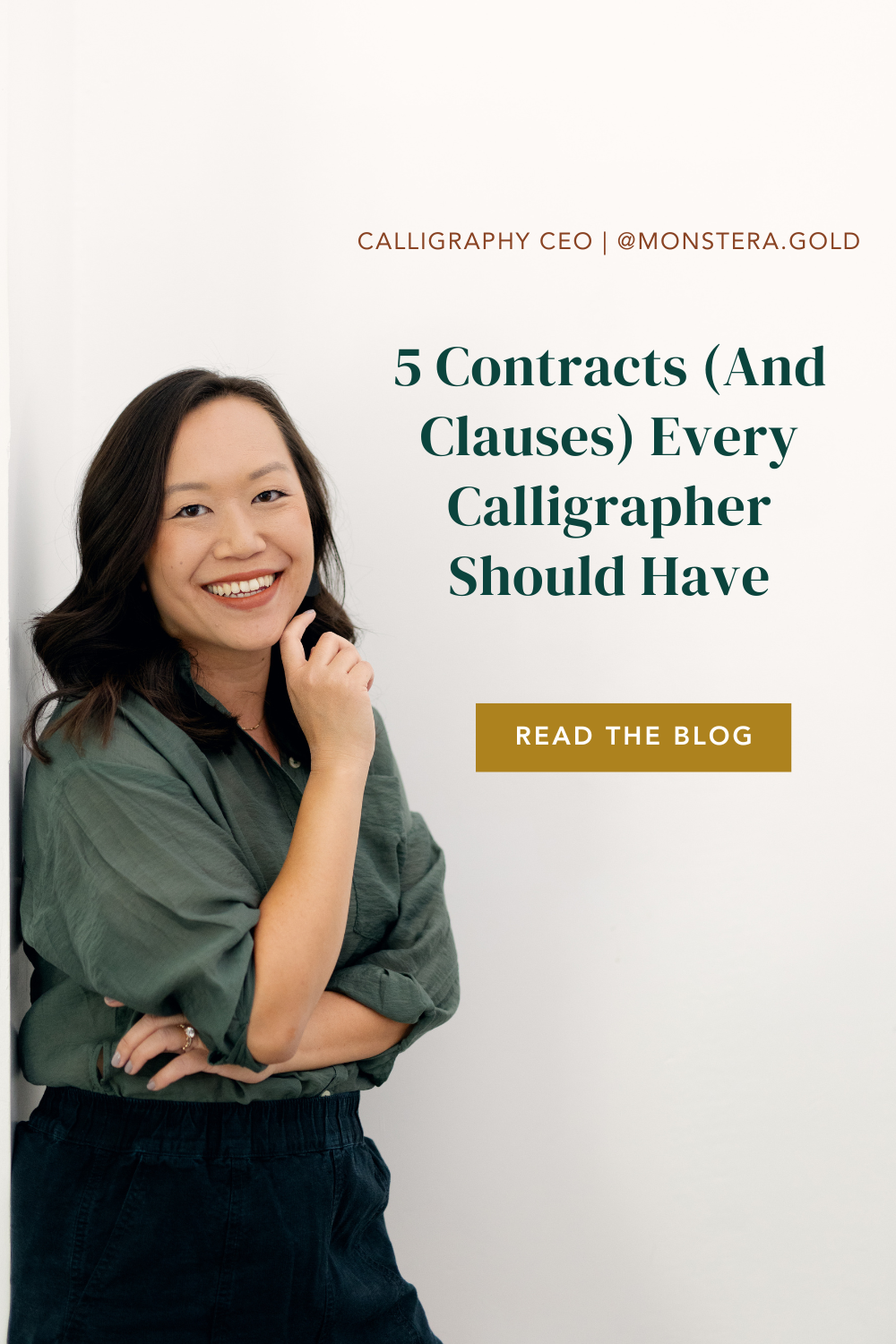5 Contracts (And Clauses) Every Calligrapher Should Have
You’ve heard that you need a contract for your calligraphy business, but have no idea where to start or what to put in it? You’re in the right place! Contracts can feel intimidating when you’re starting out. Coming from a corporate background, I knew firsthand how important it was to protect myself. That meant using contracts from day one — not just to protect myself legally, but to establish clear expectations with every client, even when they were friends.
Over the years, having clear, well-defined contracts has saved me more than once. I’ve fine-tuned my contracts based on real situations I’ve faced, from rescheduled weddings to broken mirror rentals. Each change helped me feel more confident, especially as my business evolved to include live calligraphy, larger signage displays, and tighter wedding timelines.
So, while I’m not a lawyer (and nothing in this blog should be taken as legal advice!), I am sharing what’s worked for me, including the types of contracts I use, the clauses that have saved me, and why I recommend The Legal Paige calligraphy contract templates to every calligrapher.
Photo by Angelica Marie Photography
Did you land here because you’re looking for a solid, reliable contract for your calligraphy business?
Keep reading to see my favorite calligraphy contracts from The Legal Paige, and which services they’re best for. Then feel free to use my affiliate code SHAOCHEN10 at checkout for 10% off!
Why You Need A Calligraphy Contract
When you’re creating something as meaningful and time-intensive as wedding calligraphy or entertaining live guests at an event, having a strong contract isn’t optional — it’s essential.
Whether you’re just starting out or feel like contracts are “too serious,” I want to encourage you to shift that mindset. Contracts don’t have to be scary or complicated — but they do need to be thorough and tailored to what you actually offer.
In my business, contracts do a lot more than cover legal “what-ifs.” They help prevent issues before they even happen. They communicate professionalism, outline boundaries, and ensure both parties are on the same page. That’s true whether I’m designing an 8-foot seating chart or personalizing luggage tags on-site at a live calligraphy event.
Here’s what I’ve found:
Contracts communicate professionalism. My clients feel reassured knowing they’re working with someone who has a clear, structured process.
They protect your time and energy. When things go wrong or unforeseen circumstances arise (like late RSVPs or last-minute changes), your contract outlines who is responsible or what happens next.
They clarify responsibilities. Who’s shipping the materials? What happens if the wedding is rescheduled? It’s all in writing.
They support your pricing and policies. Non-refundable retainers, final payment deadlines, delivery expectations, rush fees — these are easy to enforce when clearly spelled out.
They make sure you get paid (on time). I include payment terms, late fees, and what happens if an invoice goes unpaid.
Even if you’re just starting out or only booking a few projects a year, the right contract can give you peace of mind and protect your growing business. On the flip side, unnecessary stress from not having clear policies and a contract can quickly kill your passion and joy for your business!
The Calligraphy Contract Templates I Use (And Recommend)
Depending on the services you offer, the kind of contract you need might vary. When I was starting out, I didn’t know if one general contract would cover everything, but over time, as I added offerings, I realized that having a tailored agreement for each type of service made everything smoother for both me and my clients.
Photo of Paige Griffith, Owner of the Legal Paige
Like I said before, I’m no lawyer, and I’m not a risk taker when it comes to legal protection. So, I knew I would NOT be creating my own contracts and I would not use some free, sketchy contract template off Google. I’ve purchased contract templates from different shops before, but some of them were so convoluted that I wasn’t confident about using them because there were sections I didn’t understand or didn’t know how to customize for my own business.
Eventually, I found a template shop, The Legal Paige, run by attorneys who specialize in creating contracts for creative businesses. They have a whole line of contracts for calligraphers and slowly, over time, I’ve collected almost all of them. Plus, I was also asked to give Paige and her team suggestions of policies to be included that reflect our calligrapher-specific needs and experiences, which she has incorporated into the latest versions of these contracts. That's another great thing that I love about her contract templates - she releases periodic updates which you get for free once you have purchased a template, which is so important as legal regulations and AI evolves!
They’re easy to use and provide guidance on how to customize certain sections, with comments in the template like “best practice here is 30 days”. I like having those benchmarks to customize from, rather than just pulling random numbers or phrases out of the air. I think this is a huge benefit to Paige’s contracts! If you’re looking for a new contract template, use code SHAOCHEN10 for 10% off any of the The Legal Paige contracts below.
Here are my recommended contract templates for calligraphers and stationers, including the ones I personally use in my business, all from The Legal Paige!
Standard Calligraphy Contract
BEST FOR: Custom wedding signage, envelope addressing, and custom calligraphy projects.
This is the primary contract I use in my business. The Legal Paige’s standard calligraphy contract covers the essentials of custom calligraphy services, including deposits, timelines, artistic style clauses, and what happens if the client cancels or changes the scope of the project. It’s saved me so many times when clients changed quantities last-minute or wanted something tweaked after approving the final design. It’s perfect if you primarily work on corporate or wedding signage and don’t need the added logistics of printed stationery or event-day services.
Stationery Contract
BEST FOR: Wedding invitation suites and custom stationery services.
If you offer stationery design or printed pieces, this contract template protects you on things like last-minute requests for revisions, production timelines, proof approval, and more.
Calligraphy + Stationery Contract
BEST FOR: Calligraphers who also offer printed stationery, including save the dates, invitations, envelopes, greeting cards, and other custom paper goods
Let’s say you have projects that include both signage and stationery deliverables. You could piece together parts of both contracts, but that’s risky and means you’ll have to buy two contracts. Or you could get this contract that covers both types of services! It outlines everything from proof approval to shipping timelines, rush fees, and more. It includes situational protections, like if your client asks for last-minute quantity changes or wants something tweaked after approving the final design.
Photo by Angelica Marie Photography
Live Calligraphy Contract
BEST FOR: In-person events like brand activations and weddings or conferences where you personalize items on-site.
This is a must-have if you're doing live calligraphy! It includes venue requirements (like table, chair, lighting), what items will be customized, how long you’ll stay, what happens if you go over time, and more. For me, this contract brings peace of mind, especially when I’m walking into new venues or working with brand partners. It sets expectations right away and makes me look more professional from the start.
Website Terms + Privacy Policy Template
BEST FOR: Your calligraphy website, even if it’s just an inquiry form or a portfolio.
This one’s not a traditional contract, but it’s important and at times legally required! Having Terms & Conditions and a Privacy Policy page on your website is critical — especially if you’re collecting emails, accepting payments, or you’re not sure if your website is collecting cookies/analytics. I use this bundle to make sure my website is legally sound, and I recommend it to all my students as a foundational layer of protection.
I know seeing so many different contracts can be intimidating, so choose the one(s) that best suit your services. Just don’t make the mistake of not having a contract at all! To show you how important it is, let me explain some of the clauses in these templates and why they’re so important.
Photo by Gabrielle Henderson
Contract Clauses That Have Saved Me (More Than Once)
A clause refers to a section of your contract. When I first started using contracts, I knew what a clause was, but I didn’t always know what to look for to protect a calligrapher. But over time, and through real client situations, I learned which clauses were absolutely essential. These aren’t just “nice to haves.” These are the things that have protected my time, income, and peace of mind. Here are a few of the contract clauses I swear by — all of which are included in the templates I mentioned above.
Artistic Style + Creative License
This one might sound simple, but it’s critical, because calligraphy is subjective. This clause clarifies that you have full creative direction once the client approves the concept or style guide and that they had ample time before hiring you to review your artistic style and range of work. This protects my artistic integrity if a client asks me to produce a replica of someone else’s work or even a font, and it allows me to defend my work if someone asks for a refund based on a preference, not a mistake. It also gives me more creative freedom to explore ideas that I haven’t done before, and allows room for my style to evolve, within the client’s vision, of course.
Cancellations + Rescheduling
Unfortunately, it’s not unheard of for weddings to get rescheduled or cancelled entirely. If your contract doesn’t account for that, you can easily get stuck in limbo or lose out on income.
I use a non-refundable retainer (not a “deposit”) that’s due upon booking, and my contract spells that out clearly. It secures their date on my calendar and makes sure that I get paid even if the client cancels, moves their date, or ghosts. It’s saved me multiple times, especially during COVID and when wedding plans shift.
Editing Revisions & Mock-Ups
This contract clause has saved me so much back and forth. My contract now includes clear language around how many rounds of revisions are included, when they’re due, and that the client must sign off on a final draft or mock-up before production begins. It keeps things moving — and keeps both parties accountable.
Exclusive Calligrapher
This is one people often overlook, but it matters, especially for weddings or live events. This clause makes it clear that you’re the only calligrapher booked for the event. Just like you’d hire one photographer, one florist, one planner — your work deserves the same level of clarity and respect. I’ve seen couples mix pieces from multiple calligraphers (and Etsy creators), and the styles didn’t match, leading to confusion and less-than-stellar photos. This clause protects your brand, ensures consistency, and prevents your work from being confused with someone else’s.
You Need The Legal Paige Calligraphy Contracts
If you’ve been nodding along and thinking, “Okay, I need to update my contract ASAP,” I’ve got you! All of the contracts I use are from The Legal Paige. They’re written by licensed attorneys who get the creative world, and they’ve created templates just for calligraphers, including options for live events, stationery, and more.
I’m an affiliate for The Legal Paige, which means if you purchase through my link, I’ll earn a small commission (at no extra cost to you!) and you get a discount for using my code. More importantly, I recommend these templates to every single one of my students. They’ve protected my business more times than I can count and I truly believe they’re worth every penny.
Click here to view all of The Legal Paige’s contract templates for calligraphers and stationers.
It’s Time To Protect Your Income
I know contracts can feel intimidating when you’re starting out. They’re not the fun, pretty part of calligraphy, but they are the layer of protection that allows you to secure your income and reduce your stress so that you can run a sustainable business for a long time to come.
You don’t need to be a legal expert. You just need a contract that’s clear, thorough, and designed for the kind of work you actually do. That way, when something unexpected comes up (because it will), you’re ready.
Whether you’re booking your first client or your fiftieth, I hope this gives you a clear starting point and the confidence to protect the creative business you’re building. And don’t forget to use SHAOCHEN10 at checkout for 10% off.




